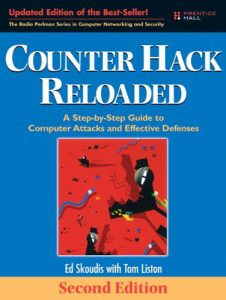“I finally get it! I used to hear words like rootkit, buffer overflow, and idle scanning, and they just didn’t make any sense. I asked other people and they didn’t seem to know how these things work, or at least they couldn’t explain them in a way that I could understand. Counter Hack Reloaded is the clearest explanation of these tools I have ever seen. Thank you!”
—Stephen Northcutt, CEO, SANS Institute
“Ed Skoudis does it again! With this new edition, Ed takes a phenomenal work to the next level! This book is a ‘must-have’ and a ‘must-read’ for anyone remotely associated with computers and computer security.”
—Harlan Carvey, CISSP, author of Windows Forensics and Incident Recovery
“Ed Skoudis is a rare individual. He knows the innards of all the various systems, knows all the latest exploits and defenses, and yet is able to explain everything at just the right level. The first edition of Counter Hack was a fascinating read. It’s technically intriguing and very clear. . . . A book on vulnerabilities, though, will get out of date, and so we definitely needed this updated and significantly rewritten second edition. This book is a wonderful overview of the field.”
—From the Foreword by Radia Perlman, series editor, The Radia Perlman Series in Computer Networking and Security; author of Interconnections; and coauthor of Network Security: Private Communications in a Public World
“What a great partnership! Ed Skoudis and Tom Liston share an uncanny talent for explaining even the most challenging security concepts in a clear and enjoyable manner. Counter Hack Reloaded is an indispensable resource for those who want to improve their defenses and understand the mechanics of computer attacks.”
—Lenny Zeltser, coauthor of Malware: Fighting Malicious Code
“Ed Skoudis does it again! With this new edition, Ed takes a phenomenal work to the next level! This book is a ‘must-have’ and a ‘must-read’ for anyone remotely associated with computers and computer security.”
—Harlan Carvey, CISSP, author of Windows Forensics and Incident Recovery
“In addition to having breadth of knowledge about and probing insights into network security, Ed Skoudis’s real strength is in his ability to show complex topics in an understandable form. By the time he’s done, what started off as a hopeless conglomeration of acronyms starts to sound comfortable and familiar. This book is your best source for understanding attack strategies, attack tools, and the defenses against both.”
—William Stearns, network security expert, www.stearns.org
“This book is a must-have for anyone in the Internet security game. It covers everything from the basic principles to the fine details of online attack methods and counter-strategies and is very engagingly written.”
—Warwick Ford, coauthor of Secure Electronic Commerce
For years, Counter Hack has been the primary resource for every network/system administrator and security professional who needs a deep, hands-on understanding of hacker attacks and countermeasures. Now, leading network security expert Ed Skoudis, with Tom Liston, has thoroughly updated this best-selling guide, showing how to defeat today’s newest, most sophisticated, and most destructive attacks.
For this second edition, more than half the content is new and updated, including coverage of the latest hacker techniques for scanning networks, gaining and maintaining access, and preventing detection. The authors walk you through each attack and demystify every tool and tactic. You’ll learn exactly how to establish effective defenses, recognize attacks in progress, and respond quickly and effectively in both UNIX/Linux and Windows environments.
Important features of this new edition include
- All-new “anatomy-of-an-attack” scenarios and tools
- An all-new section on wireless hacking: war driving, wireless sniffing attacks, and more
- Fully updated coverage of reconnaissance tools, including Nmap port scanning and “Google hacking”
- New coverage of tools for gaining access, including uncovering Windows and Linux vulnerabilities with Metasploit
- New information on dangerous, hard-to-detect, kernel-mode rootkits






